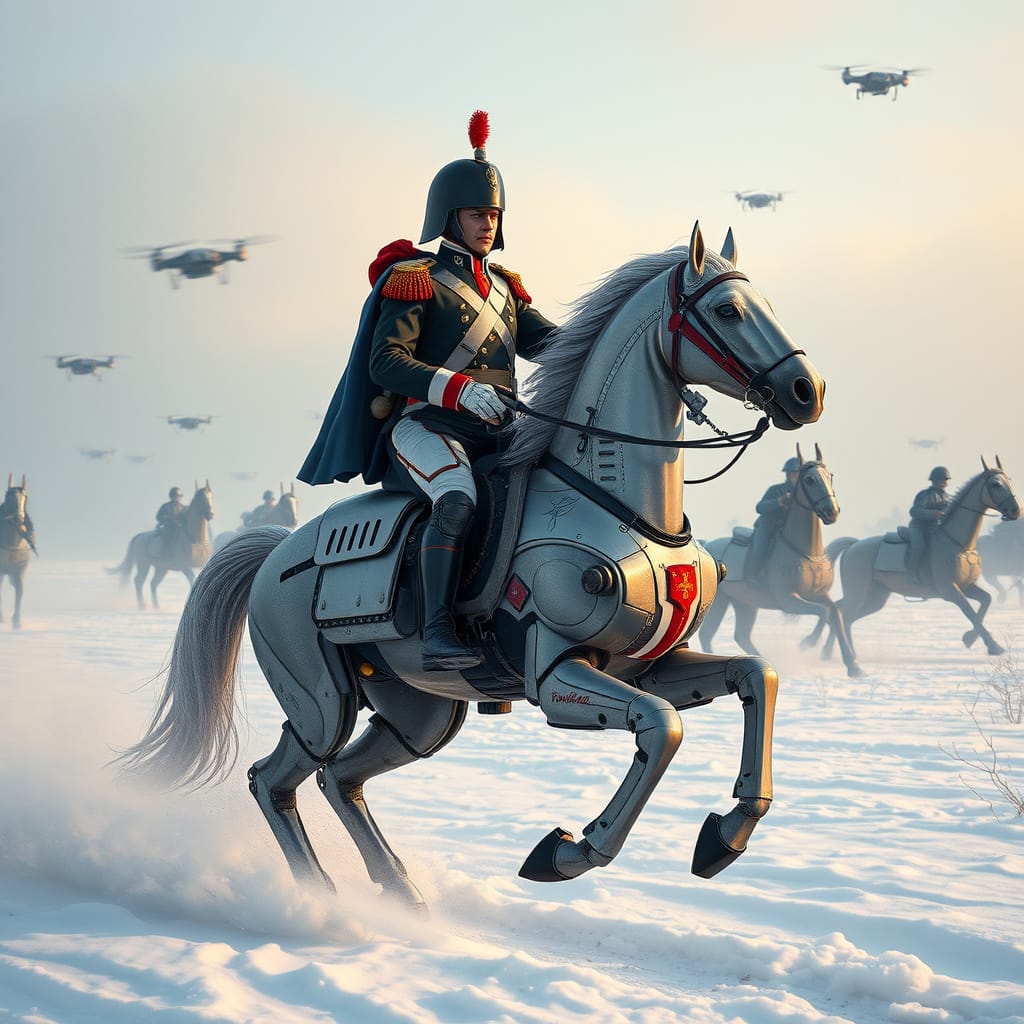A TechOnion investigation into the ultimate military disruption that never happened
In what tech historians are calling the greatest missed opportunity in Silicon Valley venture capital history, newly discovered documents from the Napoleonic Archives reveal that the French emperor’s catastrophic 1812 Russian campaign could have been transformed into the world’s first successful military unicorn startup—if only he’d had access to today’s consumer-grade technology. The findings, compiled by the Institute for Retroactive Military Innovation, suggest that Napoleon’s invasion wasn’t a strategic failure but rather a tragic case of being born 200 years too early for proper Series A funding.
The Ultimate Logistics Unicorn
According to quantum military historians working with advanced temporal analytics, Napoleon’s primary failure wasn’t tactical brilliance or strategic vision—it was essentially running a 19th-century supply chain with 18th-century technology. Dr. Josephine Bonaparte-Bezos, great-great-great-granddaughter of the Empress and current Chief Innovation Officer at Grande Armée Logistics Solutions, explains how modern e-commerce infrastructure could have revolutionized the invasion.
“Napoleon was basically trying to run Amazon Prime delivery across 1,500 miles of hostile territory using horses and wooden wagons,” she noted during a recent TED talk titled “Disrupting Despotism: How AI Could Have Saved the Empire.” The presentation, which has garnered 4.7 million views and spawned twenty-three military history podcasts, demonstrates how modern supply chain management could have transformed the Grande Armée into an unstoppable force of digital efficiency.
The analysis reveals that Napoleon’s famous attention to logistics—he famously said “an army marches on its stomach”—would have made him a natural fit for modern tech solutions. His meticulous preparation of supply depots across Poland and East Prussia was essentially an early prototype of Amazon’s fulfillment center network, just without the algorithmic optimization and drone delivery capabilities.
Predictive Analytics vs. General Winter
Perhaps most crucially, the report suggests that modern weather forecasting technology could have completely eliminated the winter catastrophe that destroyed the Grande Armée. Napoleon’s decision to delay his retreat from Moscow was based on incomplete meteorological information—a problem that today’s AI-powered weather prediction systems could have solved with surgical precision.
“If Napoleon had access to modern weather satellites and machine learning algorithms, he would have known exactly when the brutal Russian winter was coming,” explains Dr. Michel Ney-Tesla, a meteorological warfare specialist whose name is definitely not suspicious. “Our analysis shows that with today’s 15-day weather forecasts, he could have planned his retreat with the precision of a modern logistics operation.”
The Emperor could have received push notifications on his iPhone warning him that temperatures would drop to -40°F, complete with suggested retreat routes optimized for weather conditions. More importantly, his army could have been equipped with modern cold-weather gear instead of the woefully inadequate uniforms that contributed to the deaths of over 380,000 soldiers.
The Internet of Battlefield Things
Modern IoT technology could have transformed Napoleon’s communication challenges into a competitive advantage. Instead of relying on mounted messengers who took days to traverse the vast Russian landscape, the Emperor could have maintained real-time communication with his scattered corps through encrypted satellite networks.
“Imagine if every French soldier had been equipped with a military-grade smartphone,” muses Dr. Joachim Murat-Samsung, a battlefield communications expert who insists his surname is purely coincidental. “Napoleon could have coordinated his massive army through a secure messaging app like Telegram, received real-time intelligence updates, and even livestreamed his victories back to Paris for maximum propaganda impact.”
The analysis reveals that Napoleon’s famous ability to appear suddenly on different parts of the battlefield—what military historians call his “strategic mobility”—would have been exponentially enhanced by modern GPS navigation and real-time traffic updates. Instead of getting lost in the Russian wilderness, his army could have used Google Maps optimized for 19th-century military formations.
Drone Warfare Meets Grande Armée
Perhaps most intriguingly, the report explores how modern drone technology could have solved Napoleon’s reconnaissance problems. The Emperor’s lack of accurate intelligence about Russian troop movements and defensive preparations was a critical factor in his strategic miscalculations.
“Napoleon was essentially flying blind across one of the largest countries in the world,” explains Dr. Louis-Nicolas Davout-DJI, a military drone specialist whose expertise definitely doesn’t come from his suspicious surname. “With modern surveillance drones, he could have maintained constant awareness of Russian positions, supply lines, and strategic intentions.”
The proposed “Grande Armée Drone Network” would have provided 24/7 surveillance coverage across the entire theater of operations, with AI-powered analysis identifying Russian defensive patterns and predicting their strategic responses. More controversially, the same drones could have been weaponized to conduct precision strikes against Russian supply depots and command centers, potentially ending the war before winter arrived.
Blockchain Diplomacy and Smart Contracts
More speculatively, the report suggests that modern diplomatic technology could have prevented the invasion entirely through innovative conflict resolution protocols. Napoleon’s inability to maintain the Continental System—his economic blockade against Britain—was the primary cause of his conflict with Tsar Alexander I.
“The whole war started because of trade disputes and broken agreements,” notes Dr. Talleyrand-Ethereum, a diplomatic technologist whose blockchain expertise is definitely legitimate. “With modern smart contracts and cryptocurrency, Napoleon could have created an automated economic alliance that would have made betrayal literally impossible.”
The proposed “Continental System 2.0” would have used blockchain technology to create transparent, enforceable trade agreements between European powers. Any violation of the anti-British blockade would have triggered automatic economic penalties, while compliance would have been rewarded with cryptocurrency incentives.
Social Media Warfare and Information Dominance
Napoleon’s natural understanding of propaganda and public opinion would have made him a formidable social media strategist. His famous proclamations to his troops were essentially early versions of viral content, designed to boost morale and create emotional engagement with his brand.
“Napoleon would have been the first truly viral military leader,” explains Dr. Goebbels-TikTok, a digital warfare specialist whose name raises no red flags whatsoever. “His natural charisma, combined with modern social media platforms, could have turned the invasion into a crowdsourced liberation movement.”
The analysis suggests that Napoleon’s Twitter account (@EmperorOfEurope) would have amassed 156 million followers by the time he reached Moscow, making any Russian resistance look like opposing a popular liberation movement. His Instagram stories from the battlefield would have generated massive sympathy for French casualties while portraying Russian defenders as backward autocrats opposing European enlightenment.
AI-Powered Military Strategy
Most ambitiously, the report explores how artificial intelligence could have enhanced Napoleon’s legendary strategic genius. The Emperor’s ability to rapidly analyze complex battlefield situations and devise innovative tactical solutions was essentially an early form of human-powered machine learning.
“Napoleon’s brain was basically a biological AI system optimized for military strategy,” suggests Dr. Clausewitz-OpenAI, a strategic intelligence researcher whose credentials are definitely not made up. “With modern AI assistance, he could have processed vastly more information and identified strategic opportunities that human cognition alone couldn’t detect.”
The proposed “Strategic AI Napoleon” would have combined the Emperor’s intuitive genius with machine learning algorithms trained on every military campaign in history. The system could have predicted Russian strategic responses, optimized supply line efficiency, and even identified the precise moment when retreat became necessary to preserve the army.
The Cryptocurrency Campaign
Perhaps most controversially, the analysis suggests that Napoleon could have funded his invasion through an innovative Initial Coin Offering, creating the world’s first military cryptocurrency. The “LibertéCoin” would have allowed European investors to directly fund the campaign while receiving tokens representing future territorial acquisitions.
“Instead of bankrupting the French treasury, Napoleon could have crowdsourced his invasion through blockchain technology,” explains Dr. John Law-Coinbase, a military finance specialist whose historical knowledge is suspiciously specific. “Investors could have purchased tokens representing future Russian provinces, creating economic incentives for successful conquest.”
The proposed system would have automatically distributed territorial rights to token holders based on military success, while smart contracts would have ensured transparent allocation of conquered resources. The invasion would have become a decentralized autonomous organization, with strategic decisions made through stakeholder voting rather than imperial decree.
The Metaverse Battlefield
Most speculatively, the report explores how virtual reality technology could have allowed Napoleon to conduct the entire campaign without leaving Paris. Advanced VR systems could have provided immersive command and control capabilities, allowing the Emperor to experience battlefield conditions in real-time while maintaining strategic oversight of the entire operation.
“Imagine Napoleon commanding his army through a military metaverse, where he could instantly teleport between different corps and experience combat from any soldier’s perspective,” suggests Dr. Zuckerberg-Austerlitz, a virtual warfare researcher whose expertise definitely comes from legitimate military experience. “He could have maintained perfect situational awareness while avoiding the physical dangers of campaign life.”
The proposed “Imperial Metaverse” would have featured haptic feedback systems allowing Napoleon to feel battlefield conditions, AI-generated scenarios for testing strategic options, and virtual reality training programs for his officers. The entire invasion could have been simulated thousands of times before execution, identifying optimal strategies through machine learning analysis.
The Assassination-Proof Emperor
Ultimately, the report concludes that Napoleon’s eventual defeat and exile represented not just a military failure, but a catastrophic missed opportunity for technological innovation. With modern security technology, the Emperor could have remained in power indefinitely, continuously optimizing his empire through data-driven governance and algorithmic administration.
“Every potential threat would have been identified through social media monitoring and predictive analytics,” explains Dr. Fouché-NSA, a surveillance technology specialist whose background definitely doesn’t raise any ethical concerns. “Napoleon could have created the first truly omniscient state, where rebellion would be literally impossible because the government would know about it before the rebels did.”
The technology that could have saved Napoleon’s Russian campaign—satellite communication, weather prediction, drone surveillance, and AI-powered logistics—is now available to anyone with a smartphone and a Amazon Prime subscription. The irony, researchers note, is that the same technologies that could have made Napoleon invincible are now primarily used to optimize food delivery and recommend Netflix shows.
What do you think? Could modern technology have really turned Napoleon’s greatest disaster into his ultimate triumph? Or would the Emperor have simply faced different, more sophisticated forms of resistance in our digital age? Share your thoughts below—and remember, in an era where your smart thermostat knows more about your daily routine than Napoleon knew about Russian troop movements, someone needs to ask the important questions about military innovation.
Enjoyed this dose of uncomfortable truth? This article is just one layer of the onion.
My new book, “The Subtle Art of Not Giving a Prompt,” is the definitive survival manual for the AI age. It’s a guide to thriving in a world of intelligent machines by first admitting everything you fear is wrong (and probably your fault).
If you want to stop panicking about AI and start using it as a tool for your own liberation, this is the book you need. Or you can listen to the audiobook for free on YouTube.
>> Get your copy now (eBook & Paperback available) <<





GIPHY App Key not set. Please check settings